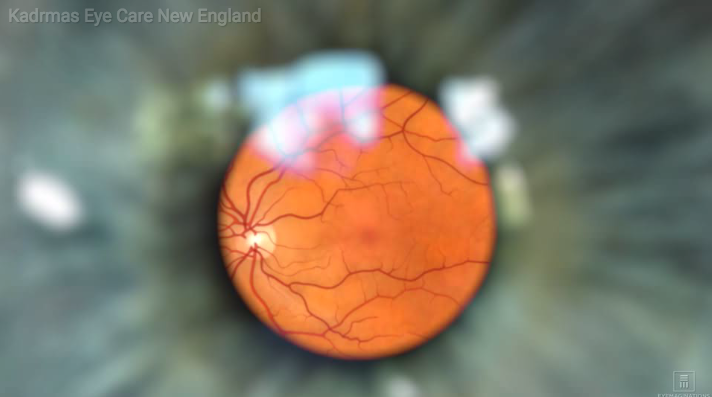|
Before we dive into management and treatment, it’s important to note that there are two forms of AMD: Dry AMD and Wet AMD. The two types of AMD are treated differently, so your eye doctor must perform the necessary tests to determine which form of AMD you have. (To learn more about those tests, visit our previous post in our National AMD & Low Vision Awareness Month series.)
It is also important to note that currently, there is no treatment available that reverses the effects of AMD. To prevent further vision loss, AMD must be diagnosed and managed or treated as early as possible.
Managing Dry AMD
Dry AMD is the more common form of AMD, affecting up to 90 percent of people with AMD according to the National Eye Institute. It occurs in three phases, and although it generally affects both eyes, it can affect one more than the other.
Presently, there is no cure for Dry AMD and treatment is limited to nutritional support and dietary supplements such as vitamins. Fortunately, the Age Related Eye Disease Study (AREDS) has found that a particular combination of vitamins may slow the progression of Dry AMD for people with up to a moderate level of disease. Eating a diet rich in antioxidants, including green, leafy vegetables, can also contribute to overall eye health. In addition, people suffering from low vision associated with Dry AMD can benefit from low vision aids and low vision therapy.
Your ophthalmologist who specializes in AMD can discuss the effectiveness of managing your AMD with nutritional supplements and low vision rehabilitation. Further, your ophthalmologist will teach you how to monitor your disease progression using an Amsler Grid, as well as schedule regular exams to monitor your eye health over time.
The following short videos will help you learn more about Dry AMD and nutritional support for AMD.
For more information on Dry AMD, visit our Dry Macular Degeneration and Medical Treatment for Macular Degeneration webpages. Treating Wet AMD
For a smaller group of patients with Wet AMD, treatment options are available. However, because loss of central vision can occur rapidly, having an eye exam at the first sign of symptoms and getting treatment immediately is imperative.
Like with Dry AMD, nutrition is important in the treatment of Wet AMD. In fact, according to the Mayo Clinic, evidence that the antioxidant lutein found in egg yolk, corn and green, leafy vegetables such as spinach, and omega-3 fatty acids found in fish oil may reduce the chances of developing Wet AMD is mounting.
In recent years, three medications (Lucentis, Avastin, and Eylea) have been used to inhibit the growth of blood vessels under the retina, which is characteristic of Wet AMD, helping to prevent further vision loss. These are delivered through injection and must be administered by a highly skilled and experienced retina specialist.
Some patients with Wet AMD may be treated with a type of laser treatment called photocoagulation. Although less common, if you are patient with Wet AMD whose fovea (direct center of the macula responsible for central vision) has not yet been damaged, you may benefit from photocoagulation laser treatment. Your ophthalmologist who specializes in AMD will determine if you are a candidate for this treatment.
To learn more about Wet AMD, as well as therapeutic injections and laser treatments for Wet AMD, please watch the following videos.
For more information on Wet AMD, visit our Wet Macular Degeneration, Therapeutic Injections for Macular Degeneration, and Laser Treatment for Macular Degeneration webpages. AMD (Retina) Specialist
If diagnosed with AMD, it is important to find an ophthalmologist who specializes in retinal conditions such as AMD. At Kadrmas Eye Care New England, Eddie F. Kadmras, MD, PhD, has specialized in the diagnosis, treatment, and management of retinal disease and macular degeneration for nearly two decades. He has committed his career to helping thousands of patients with their eyesight.
Dr. Kadrmas completed a vitreoretinal fellowship (additional training beyond ophthalmology residency) at Massachusetts Eye and Ear Infirmary and Harvard Medical School, as well as post-doctoral resarech at the Schepens Eye Research Institute and Harvard Medical School. He has also contributed to the research and development of innovations in surgical techniques and instrumentation that define how vitreoretinal surgery is preformed today.
If you are concerned about your vision and eye health or that of a loved one, please call us today to schedule an appointment.
In our final post in our National AMD & Low Vision Awareness Month series, we will discuss living with and managing low vision caused by conditions such as AMD.
Comments are closed.
|
EYE HEALTH BLOGCategories
All
Archives
July 2024
|
|
Kadrmas Eye Care New England
55 Commerce Way, Plymouth, MA 02360
14 Tobey Road, Wareham, MA 02571 133 Falmouth Road (Rt 28), Mashpee, MA 02649 |
Phone Number:
1-508-746-8600 Hours: Monday through Friday — 8 AM – 4:30 PM |


 RSS Feed
RSS Feed
